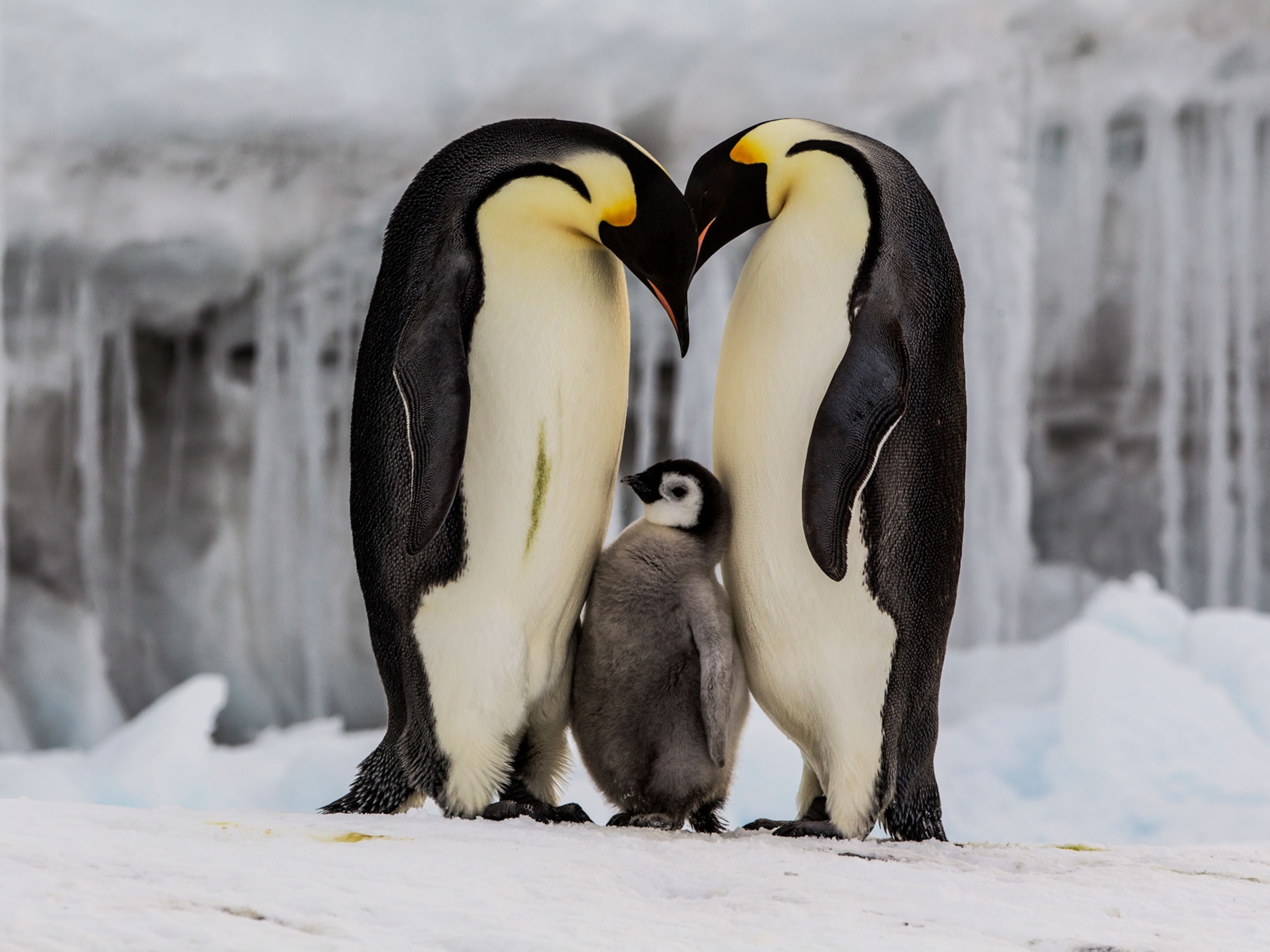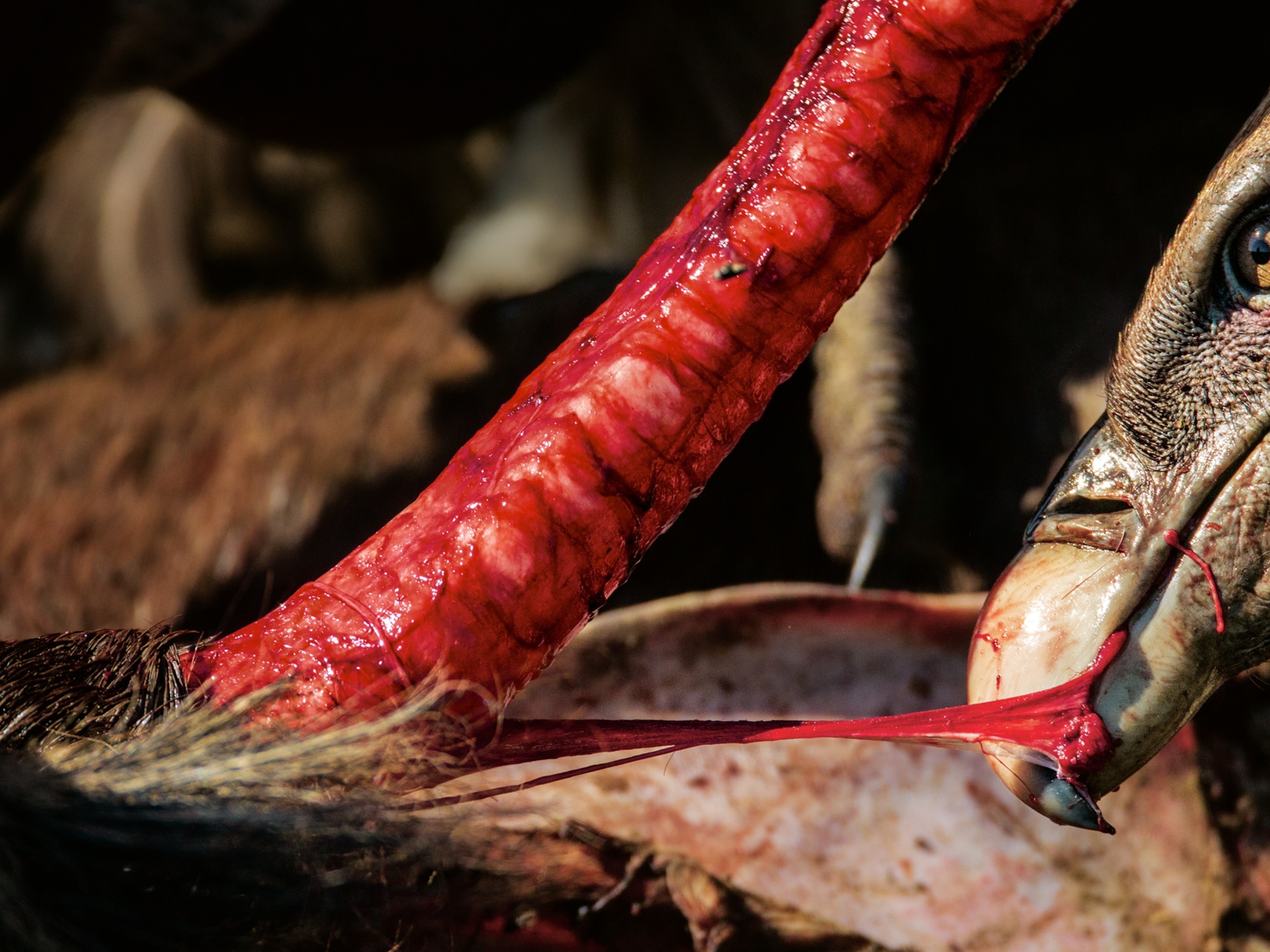
Why Africa's Vultures Are "Collapsing Toward Extinction"
A demand for vulture parts in witchcraft, as well as poisoning and urbanization, has caused a nearly 90 percent decline in the scavengers' populations.
Across Africa, vultures are electrocuted by power lines or crushed by wind turbines. Their brains are ground to snuff by witch doctors who believe the substance has magical powers. They die after eating pesticide-laced carcasses intended for lions and other predators.
As a result, vulture populations are plummeting.
Africa's eight vulture species have declined in number by an average of 62 percent during the last 30 years, according to the first estimates of a continent-wide decline in the large birds. Six of those species would likely be considered critically endangered by the International Union for Conservation of Nature.
While vultures are not cute and cuddly, they are one of nature's most important scavengers—a flock can strip a carcass in a matter of minutes, said study leader Darcy Ogada, assistant director of Africa Programs for the Peregrine Fund, an Idaho-based nonprofit dedicated to saving birds of prey. (Read more about Ogada's work in her own words.)
But Ogada predicts these natural recyclers, which breed slowly and need years to mature, could be extinct in Africa in the next 50 to 100 years.
"The impact of their declines are huge," Ogada says, whose research is funded by National Geographic. "They're providing such a huge service to such a huge population."
Tracking the Birds
In 2012, Ogada and colleagues extensively reviewed scientific literature on Africa's vulture populations, as well as unpublished data from road surveys and counts of dead vultures.
The team analyzed the data by assigning a vulture species in each country to one of four categories: extinct or in severe decline, strong decline, moderate decline, or no decline.
Of the 95 vulture populations they examined, 85 (or 89 percent) were either nationally extinct or had experienced severe declines, according to the study, published recently in the journal Conservation Letters.
The scientists also studied the major threats to African vultures based on data from published and unpublished articles, as well as media reports, drawn from 1961 to 2014.
That work revealed that poisoning from eating pesticide-laced carcasses caused as many as 60 percent of the vulture deaths recorded since the 1970s.

When a large predator such as a lion kills livestock, a farmer will sometimes sprinkle poison on the carcass to kill the predator in retaliation, a practice that's illegal but rarely prosecuted. Vultures usually get to the corpse—and the poison—first. (Related: "Lions, Hyena Killed With Poisoned Meat.")
Pesticides are poorly regulated and abused in Africa, adds Ogada. Usually sold as "lion killer" in several African countries, many farmers don't know what the chemicals are really used for.
Vulture Threats
David Allan, curator of birds at the Durban Natural Science Museum in South Africa, studies Cape vultures in South Africa. He says these vultures have largely disappeared from commercial farming areas in the country where pesticide use is routine.
But there are various threats beyond pesticides, he notes.
Rapid urbanization in parts of Africa has displaced vultures from their habitat. A massive growth in wind farms across the continent is also a concern—the birds often collide with the turbines.
Vultures are also also targets for poachers, who sell their parts to people who use witchcraft. The birds are known for their tremendous eyesight, and many believe their body parts can be used to see into the future. Relatively little is known about the illegal and secretive trade. (See "An Awareness of Vultures in Our Poisonous World.")
The scavengers also die after feeding on carcasses left behind by poachers. Illegal hunters poison the corpses to throw off law enforcement, which use circling vultures as a beacon for illegal activity.
In July 2013 in Namibia, Ogada came across what she called a horrific scene: About 500 dead vultures surrounded a pesticide-laden elephant carcass. Poachers had poisoned the birds and left their bodies to rot.
Troubling History
The impacts of disappearing vultures may be devastating in developing countries of Africa, where disposing of potentially harmful carcasses is left to nature, Ogada notes.
As an example, look no further than India, Allan says, where vulture populations collapsed by more than 96 percent in the 1990s. (Related: "Many Asian Vultures Close to Extinction, Survey Finds.")
Poisoned by diclofenac, a drug used to treat sick livestock, India's vultures died en masse of liver failure. Without the aerial cleanup crew, feral dogs took up the role as scavengers. As the dog population exploded, so did diseases such as rabies—of the 55,000 annual rabies deaths worldwide, 20,000 occur in India.
The cost to public health was enormous: Healthcare costs climbed by an estimated $34 billion in India between 1993 and 2006, according to Allan.
Ogada says the same could potentially happen in West Africa, where human populations are high and vulture populations are dismally low.
The first step, Ogada says, is for governments in Africa to regulate pesticide use, for instance by creating a registry that can limit the amounts a person can buy at one time.
She and other researchers have also hosted programs on pesticides' dangers for local people in Africa.
"It can start in one country and hopefully snowball to other regions," she says.
Follow Matt McCall on Twitter.
You May Also Like
Go Further
Animals
- How scientists are piecing together a sperm whale ‘alphabet’How scientists are piecing together a sperm whale ‘alphabet’
- Orangutan seen using plants to heal wound for first timeOrangutan seen using plants to heal wound for first time
- What La Palma's 'lava tubes' tell us about life on other planetsWhat La Palma's 'lava tubes' tell us about life on other planets
- This fungus turns cicadas into zombies who procreate—then dieThis fungus turns cicadas into zombies who procreate—then die
Environment
- What the Aral Sea might teach us about life after disasterWhat the Aral Sea might teach us about life after disaster
- What La Palma's 'lava tubes' tell us about life on other planetsWhat La Palma's 'lava tubes' tell us about life on other planets
- How fungi form ‘fairy rings’ and inspire superstitionsHow fungi form ‘fairy rings’ and inspire superstitions
- Your favorite foods may not taste the same in the future. Here's why.Your favorite foods may not taste the same in the future. Here's why.
- Are the Great Lakes the key to solving America’s emissions conundrum?Are the Great Lakes the key to solving America’s emissions conundrum?
- The world’s historic sites face climate change. Can Petra lead the way?The world’s historic sites face climate change. Can Petra lead the way?
History & Culture
- These were the real rules of courtship in the ‘Bridgerton’ eraThese were the real rules of courtship in the ‘Bridgerton’ era
- A short history of the Met Gala and its iconic looksA short history of the Met Gala and its iconic looks
- Meet the ruthless king who unified the Kingdom of Hawai'iMeet the ruthless king who unified the Kingdom of Hawai'i
- Hawaii's Lei Day is about so much more than flowersHawaii's Lei Day is about so much more than flowers
Science
- Why ovaries are so crucial to women’s health and longevityWhy ovaries are so crucial to women’s health and longevity
- Orangutan seen using plants to heal wound for first timeOrangutan seen using plants to heal wound for first time
Travel
- Why this unlikely UK destination should be on your radarWhy this unlikely UK destination should be on your radar




